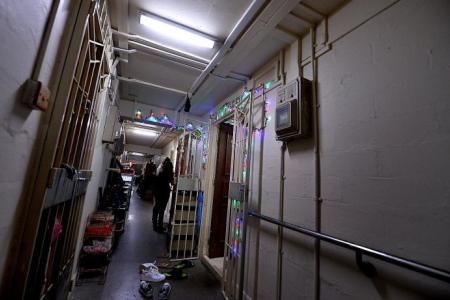Minister Tan Chuan-Jin: It's everyone's responsibility to help prevent child abuse
More children are being abused.
The Ministry of Social and Family Development's (MSF) Child Protective Service (CPS) received 2,022 reports and inquiries about child abuse last year.
Of these, it investigated 551 that were instances of serious abuse.
This was an increase of about 40 per cent in serious child abuse cases, compared to the period from 2012 to 2014.
In a Facebook post, MSF Minister Tan Chuan-Jin says it was heartbreaking to read about Daniel's case.
"It pains me to know that things could have turned out very differently, if only someone had sounded the alarm earlier.
"This 'someone' can be a housemate, neighbour, relative, friend, passer-by… in fact, anyone in the community who knows or suspects that there could be family violence or child abuse happening - it is everyone's responsibility to do something about it," he says.
The likelihood of a neighbour hearing the cries of a child in an HDB estate would be high.
Yet some neighbours won't call for help.
Psychiatrist at Glenagles Hospital Dr Lim Boon Leng says people are reluctant to make assumptions about what happens in another home.
He says: "Neighbours might think it is just some shouting, that the parents are disciplining their children.
"They have no idea the child might be abused."
This stems from a non-confrontational mentality, says Singapore Children Society's senior director for youth services, Dr Carol Balhetchet.
"The approach is to mind your own business. They don't want to jump the gun and accuse the parents because they think they don't know enough," adds Dr Balhetchet
There is also the fear that families can be torn apart if these reports are made, says Dr Lim.
Dr Balhetchet adds: "It is a double-edged sword because the caregivers might end up being taken away.
"They worry about the child, who will look after him or her then?"
But these fears should not deter neighbours from reporting child abuse to the authorities, says Miss Annie Chia, lead social worker for the Family Service Centre (FSC) in the Telok Blangah Crescent area.
"FSCs are not there 24 hours a day. Neighbours see and hear more things.
"If the evidence is not strong, they can monitor and either let us or the police know, especially if it is a repeated incident," she says.
She adds that FSCs act on the tip-offs from neighbours and investigate cases that are highlighted to them.
"Our first step will be to try to find out more. We might pay these homes a visit and assess the situation from there. If there are reasonable grounds, we will call the police," she says.
OFFER ASSISTANCE
An MSF spokesman says neighbours and other bystanders can in fact play a part in preventing, detecting and reporting abuse.
He says: "If neighbours or bystanders witness an adult getting angry at a child or a terrified child crying, they can approach the family to check if the child is all right or they can offer assistance.
"Such small acts can help to diffuse a tense situation and stem violence before it escalates in intensity and severity. Family violence is not a private matter and bystanders should do something if they suspect violence."
Those concerned can also contact the ComCare line, CPS centres, family service centre. In the event that a life is in danger, the police should be alerted immediately.
The outcome of not reporting child abuse can be worse than keeping mum and being wrong, say experts.
Dr Lim says: "Repeated child abuse can lead to complex post-traumatic stress disorder in the victims. These people often grow up with a host of personality disorders."
Some of these include anxiety, anti-social personality and even depression.
There is also the possibility of the abused turning into an abuser when they grow up, perpetuating the violence that was inflicted upon them.
"They could end up becoming very angry people, lashing out constantly and hurting themselves and others," says Dr Balhetchet.
"This anger would be channelled into abuse, and it becomes a cycle."
Why did no one help?
Block 19, Telok Blangah Crescent is a 14-storey residential block with 364 one-room rental flats.
The corridors here are narrow and stuffy. If not for the lights along the corridors, which are switched on even during the day, it would be dark and damp.
Because people live so close to one another, quiet is not an option as the sounds of different TV shows mingle freely.
Here, two children were abused - one on the 10th storey and the other on the sixth.
But nobody heard them.
Over two days, The New Paper on Sunday knocked on the doors of 56 units. The residents of only 19 opened their doors.
Madam Jenny Leong, 64, lived right next door to Daniel.
"I heard a child crying in the middle of the night once, but I never asked what happened because it was so late. I also didn't talk to them because I didn't want them to think I was being a 'kaypoh' (busybody)."

She says the cries were rare, and nobody suspected Daniel was in trouble.
Mr Mohan Kumar, 58, says he never suspected anything.
"I would have done something if I heard cries for help. But in this case, I never heard children crying or screaming at all," he says.
Mr Tan Chuan Beng, 75, who works in a hospital, says: "Once I come home, I close my door and mind my own business.
"Why should I care? If we care, people say we 'kaypoh' and might even scold us."
He has been suffering from osteoporosis on his left leg for five years but still has to work.
"Also, if I call the ambulance, I'll need to pay hundreds of dollars for the fee," he says.

This is not true, but there was no convincing him as he shut the door abruptly.
Miss Siti, 28, says she is not afraid of calling the police when she suspects trouble.
"I always call the police when there are fights.
"If there are children crying or people fighting, we can hear. The flat is not soundproof, if I drop something at home, my neighbours can hear it too," she says.
But she had no clue Daniel was being tortured. She lives on the same floor but at the end of the corridor.
Madam Leong says following Daniel's death, she plans to be a busybody if she senses trouble.
"After this incident, if I hear children crying for help, I'll definitely call the police to prevent another tragedy from happening," she says.
But Block 19, Telok Blangah Crescent is packed with rental units and the residents are transients.
Soon, new tenants will move in.
And all too soon, Daniel's story may be forgotten.
Other cases of child abuse
UNCLE RAPED HER
A 14-year-old's life of sexual abuse came to light only after she tried to kill herself.
Her uncle first abused her when she was only 12. Two years later, he raped her.
The girl was so traumatised that she tried to kill herself by drinking bleach solution and soap powder.
On Oct 26, 2015, the 54-year-old food stall operator pleaded guilty to four counts of sexually assaulting, molesting and raping his niece.
FAMILY TORTURED HIM
Between 2009 and 2011, Zack (not his real name) endured a litany of abuse, including having hot oil splashed on his body, being hit by a belt and having his fingers snipped with a pair of scissors.
His abusers were his 46-year-old maternal grandaunt, her three daughters and her former husband.
Zack's plight came to light only after he was seen wandering alone at a bus stop in Ang Mo Kio Avenue 9, near Thye Hua Kwan Community Hospital.
His abusers were all jailed.
FATHER KILLED HER
Natalie Nikie Alisyia Sallehan was only 23 months old when she was beaten to death by her father for playing with his cigarettes in 2010.
Sallehan Allaudin had slapped and punched her so hard that she died of a tear in a major vein, probably from a hard punch, kick or stomp. He was jailed for 10 years and given 10 strokes of the cane.
MUM'S BOYFRIEND KILLED HIM
In 2009, Sri Alyaniz Nazri died after 18 days of abuse by her mother's boyfriend, Mohd Azhar Ghapar. She was then two years and four months old.
He had punched her abdomen and pinched her arms, ear, chest and stomach. He also head-butted her and stepped on her abdomen, fracturing her ribs. Azhar was jailed for 12 years and given 12 strokes of the cane.
Child Protection Specialist Centres
HEART@Fei Yue
6819-9170
www.fycs.org/index.cfm?GPID=260
Monday to Friday, 9.30am to 5.30pm
Big Love Child Protection Specialist Centre
6445-0400
Monday to Friday, 9am to 6pm
Child Protective Service Helpline (MSF)
1800-777-0000
Monday to Friday, 8.30am to 5.30pm
Saturday, 8.30am to 1pm
Tinkle Friend
1800-274-4788
Monday to Friday, 2.30pm to 5pm
Online chat operating hours: Monday to Friday, 2.30pm to 5.30pm and Wednesday, 6.30pm to 8.30pm
Get The New Paper on your phone with the free TNP app. Download from the Apple App Store or Google Play Store now


